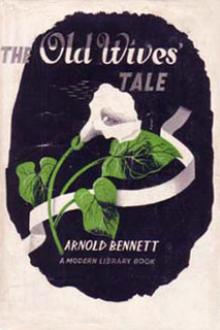Helen with the High Hand - Arnold Bennett (debian ebook reader .txt) 📗

- Author: Arnold Bennett
Book online «Helen with the High Hand - Arnold Bennett (debian ebook reader .txt) 📗». Author Arnold Bennett
"I'm going out," she said, with no further explanation.
And out she went, leaving the old man, stricken daft by too many sensations, to collect his wits.
He had not even been to the bank!
And the greatest sensation of all the nightmarish days was still in reserve for him. At a quarter-past eight some one knocked at the door. He opened it, being handier than the new servant. He imagined himself ready for anything; but he was not ready for the apparition which met him on the threshold.
Mrs. Prockter, of Hillport, asked to be admitted!
CHAPTER XI
ANOTHER CALL
Mrs. Prockter was compelled to ask for admission, because James, struck moveless and speechless by the extraordinary sight of her, offered no invitation to enter. He merely stood in front of the half-opened door.
"May I come in, Mr. Ollerenshaw?" she said, very urbanely. "I hope you will excuse this very informal call. I've altered my dinner hour in order to pay it."
And she smiled. The smile seemed to rouse him from a spell.
"Come in, missis, do!" he conjured her, warmly.
He was James; he was even Jimmy; but he was also a man, very much a man, though the fact had only recently begun to impress itself on him. Mrs. Prockter, while a dowager--portly, possibly fussy, perhaps slightly comic to a younger generation--was still considerably younger than James. With her rich figure, her excellent complexion, her carefully-cherished hair, and her apparel, she was a woman to captivate a man of sixty, whose practical experience of the sex extended over nine days.
"Thank you," said she, gratefully.
He shut the front door, as if he were shutting a bird in a cage; and he also shut the door leading to the kitchen--a door which had not been shut since the kitchen fire smoked in the celebrated winter of 1897. She sat down at once in the easy-chair.
"Ah!" she exclaimed, in relief. And then she began to fan herself with a fan which was fastened to her person by a chain that might have moored a steamer.
James, searching about for something else to do while he was collecting his forces, drew the blind and lighted the gas. But it was not yet dark.
"I wonder what you will think of me, calling like this?" she said, with a sardonic smile.
It was apparent that, whatever he thought of her, she would not be disturbed or abashed. She was utterly at her ease. She could not, indeed, have recalled the moment when she had not been at her ease. She sat in the front room with all the external symptoms of being at home. This was what chiefly surprised James Ollerenshaw in his grand guests--they all took his front room for granted. They betrayed no emotion at its smallness or its plainness, or its eccentricities. He would somehow have expected them to signify, overtly or covertly, that that kind of room was not the kind of room to which they were accustomed.
"Anyhow, I'm glad to see ye, Mrs. Prockter," James returned.
A speech which did not in the least startle Mrs. Prockter, who was thoroughly used to people being glad to see her. But it startled James. He had uttered it instinctively; it was the expression of an instinctive gladness which took hold of him and employed his tongue on its own account, and which rose superior even to his extreme astonishment at the visit. He _was_ glad to see her. She was stout and magnificent, in her silk and her ribbons. He felt that he preferred stout women to thin; and that, without being aware of it, he had always preferred stout women to thin. It was a question of taste. He certainly preferred Mrs. Prockter to Sarah Swetnam. Mrs. Prockter's smile was the smile of a benevolently cynical creature whose studies in human nature had reached the advanced stage. James was reassured by this, for it avoided the necessity for "nonsense."....Yes, she was decidedly better under a roof and a gas-jet than in the street.
"May I ask if your niece is in?" she said, in a low voice.
"She isn't."
He had been sure that she had called about Helen, if not to see Helen. But there was a conspiratorial accent in her question for which he was unprepared. So he sat down at last.
"Well," said Mrs. Prockter, "I'm not sorry she isn't. But if she had been I should have spoken just the same--not to her, but to you. Now, Mr. Ollerenshaw, I think you and I are rather alike in some things. I hate beating about the bush, and I imagine that you do."
He was flattered. And he was perfectly eased by her tone. She was a woman to whom you could talk sense. And he perceived that, though a casual observer might fail to find the points of resemblance between them, they _were_ rather alike.
"I expect," said he, "it's pretty well known i' this town as I'm not one that beats about the bush."
"Good!" said she. "You know my stepson, Emanuel?"
"He was here a bit since," James replied.
"What do you think of him?"
"How?"
"As a man?"
"Well, missis, as we are na' beating about the bush, I think he's a foo'."
"Now that's what I like!" she exclaimed, quite ravished. "He _is_ a fool, Mr. Ollerenshaw--between ourselves. I can see that you and I will get on together splendidly! Emanuel is a fool. I can't help it. I took him along with my second husband, and I do my best for him. But I'm not responsible for his character. As far as that goes, he isn't responsible for it, either. Not only is he a fool, but he is a conceited fool, and an idle fool; and he can't see a joke. At the same time he is quite honest, and I think he's a gentleman. But being a gentleman is no excuse for being a fool; indeed, I think it makes it worse."
"Nothing can make it worse," James put in.
She drew down the corners of her lips and stroked her fine grey hair.
"You say Emanuel has been here to-day?"
"Ay!" said James. "He came in an' had a sup o' tea."
"Do you know why he came?"
"Maybe he felt faintlike, and slipped in here, as there's no public nearer than the Queen Adelaide. Or maybe he thought as I was getting on in years, and he wanted for to make my acquaintance afore I died. I didna' ask him."
"I see you understand," said Mrs. Prockter. "Mr. Ollerenshaw, my stepson is courting your niece."
"Great-stepniece," James corrected; and added: "Is he now? To tell ye th' truth I didn't know till th' other day as they were acquainted."
"They haven't been acquainted long," Mrs. Prockter informed him. "You may have heard that Emanuel is thinking of going into partnership with Mr. Andrew Dean--a new glaze that Mr. Dean has invented. The matter may turn out well, because all that Mr. Dean really wants is a sleeping partner with money. Emanuel has the money, and I think he can be guaranteed to sleep. Your stepniece met Emanuel by accident through Mr. Dean some weeks ago, over at Longshaw. They must have taken to each other at once. And I must tell you that not merely is my stepson courting your niece, but your niece is courting my stepson."
"You surprise me, missis!"
"I daresay I do. But it is the fact. She isn't a Churchwoman; at least, she wasn't a Churchwoman at Longshaw; she was Congregational, and not very much at that. You aren't a Churchman, either; but your niece now goes to St. Luke's every Sunday. So does my stepson. Your niece is out to-night. So is my stepson. And if they are not together somewhere I shall be very much astonished. Of course, the new generation does as it likes."
"And what next?" James inquired.
"I'll tell you what next," cried the mature lady, with the most charming vivacity. "I like your niece. I've met her twice at the St. Luke's Guild, and I like her. I should have asked her to come and see me, only I'm determined not to encourage her with Emanuel. Mr. Ollerenshaw, I'm not going to have her marrying Emanuel, and that's why I've come to see you."
The horror of his complicated situation displayed itself suddenly to James. He who had always led a calm, unworried life, was about to be shoved into the very midst of a hullabaloo of women and fools.
His wizened body shrank; and he was not sure that his pride was quite unhurt. Mrs. Prockter noticed this.
"Oh!" she resumed, with undiminished vivacity, "it's not because I think your niece isn't good enough for Emanuel; it's because I think she's a great deal too good! And yet it isn't that, either. The truth is, Mr. Ollerenshaw, I'm a purely selfish woman. I'm the last person in the world to stand in the way of my poor stepson getting a better wife than he deserves. And if the woman chooses to throw herself away on him, that's not my affair. What I scent danger in is that your stepniece would find my stepson out. At present she's smitten by his fancy waistcoat. But she would soon see through the fancy waistcoat--and then there would be a scandal. If I have not misjudged your stepniece, there would be a scandal, and I do not think that I have misjudged her. She is exactly the sort of young woman who, when she had discovered she had made a mistake, would walk straight out of the house."
"She is!" James agreed with simple heartiness of conviction.
"And Emanuel, having no sense of humour, would leave nothing undone to force her back again. Imagine the scandal, Mr. Ollerenshaw! Imagine my position; imagine yours! _Me_, in an affair like that! I won't have it--that is to say, I won't have it if I can stop it. Now, what can we do?"
Despite the horror of the situation, he had sufficient loose, unemployed sentiment (left over from pitying himself) to be rather pleased by her manner of putting it: What can _we_ do?
But he kept this pleasure to himself.
"Nowt!" he said, drily.
He spoke to her as one sensible person speaks to another sensible person in the Five Towns. Assuredly she was a very sensible person. He had in past years credited, or discredited, her with "airs." But here she was declaring that Helen was too good for her stepson. If his pride had momentarily suffered, through a misconception, it was now in the full vigour of its strength.
"You think we can do nothing?" she said, reflectively, and leant forward on her chair towards him, as if struck by his oracular wisdom.
"What can us do?"
"You might praise Emanuel to her--urge her on." She fixed him with her eye.
Sensible? She was prodigious. She was the serpent of serpents.
He took her gaze twinkling. "Ay!" he said. "I might. But if I'm to urge her on, why didna' ye ask her to your house like, and chuck 'em at each other?"
She nodded several times, impressed by this argument. "You are quite right, Mr. Ollerenshaw," she admitted.
"It's a dangerous game," he warned her.
She put her lips together in meditation, and stared into a corner.
"I must





Comments (0)